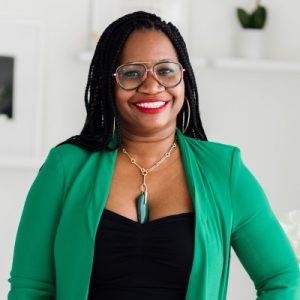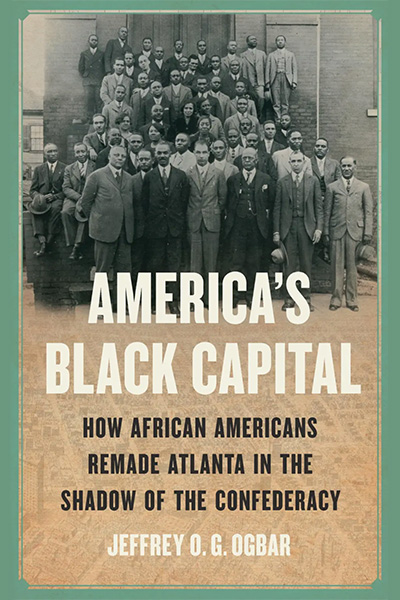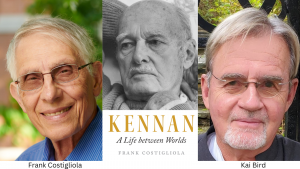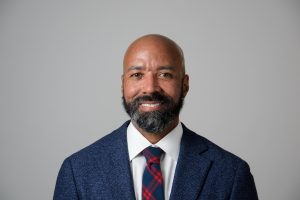Month: November 2023
America’s Black Capital: How African Americans Remade Atlanta in the Shadow of the Confederacy
Faculty Spotlight Interview with Dr. Cooper Owens
Dr. Cooper Owens is one of the new brilliant faculty members of the UConn History Department who has a joint appointment with the Africana Studies Institute. Her research interests include the history of medicine, slavery, women’s history, and 19th-century U.S. history. She is currently on sabbatical, working on a popular biography of Harriet Tubman that examines the revolutionary through the lens of disability and a monograph about  the history of race, medical discovery, and the C-section.
the history of race, medical discovery, and the C-section.
Dr. Cooper Owens kindly joined me in conversation to discuss how her research is going so far, how she is settling in at UConn, and some of her non-scholarly interests.
Listen to the Interview:
Interview Transcript:
00:00:01 Nicole Weatherwax
Thank you for coming. I appreciate you taking the time. I kind of wanted to start off with thinking
about, what are your research interests? And what inspired you to pursue these topics? I know
you’re kind of taking a little shift right now from what you’ve been doing. But maybe just a quick
little overview might be helpful.
00:00:24 Dr. Cooper Owens
Sure, so I’m Deirdre Cooper Owens. And I am a new faculty member at the Department of History
and also jointly in Africana Studies. And I’m generally known for doing historical research
in the 19th century United States, more specifically geared towards slavery, Black women,
and the history of medicine. And so what initially attracted me to doing the history of slavery,
there seemed to be such misinformation about slavery. And I was trying to reconcile some of
the misinformation that was kind of, you know, in popular culture, in history books, and, or
I should be very specific, history textbooks. And so I knew what I heard from my family members.
I’m from the Lowcountry in South Carolina, and the Gullah Geechee people and culture and language
and heritage is very connected to West Africa. And so I’d been hearing these things and just
didn’t seem to link with some of what people believed about black people and enslaved people.
And so by the time I got to my PhD program in the early 2000s at UCLA, I knew for sure I wanted to write
about black women’s experiences. I did not know exactly what. So I kind of bandied about for
a few years And so my dissertation advisor threatened to give me a topic, taking a class called
The History of Medicine. And I was really excited and shocked that American gynecology had
deep, deep linkages to slavery and the experimentation of enslaved women. And I thought, wait,
I went to an HBCU for women, for black women. I had a master’s degree from another HBCU in African
American studies and never heard of experimentation and slavery. And so it really piqued my
interest. And as you can imagine, there were not a lot of books written about the subject. And
so I went about trying to find what medical discovery meant, what experimentation meant, how
enslaved people were thinking, which was really difficult because as you know, they were largely
illiterate because the law made it so. And so it was a journey of how to do comparative history.
I also wrote about these white men, you know, who were medical men, many slave -owning physicians.
I wrote about enslaved people, and then I took a detour and wrote about Irish immigrants who
had also been experimented on. And so it was a wonderful exercise in how to apply historical
methods. It de -sexified archival research because there were days when I was bored out of my
mind trying to read, like, this really fancy handwriting from the late 18th century and 19th
century. And it was a solitary experience, but it was something that I really loved. And so fast
-forward, the book is out, it’s done well, and I kind of am staying in the history of medicine
lane, but widening it a bit to focus on disability studies. And so that’s where the next project
is taking me. understanding Harriet Tubman’s life as a disabled woman who was born into bondage.
And in fact, I just finished my first research trip of this sabbatical going to the Lowcountry
in South Carolina where she was stationed for almost three years during the Civil War.
00:04:12 Nicole Weatherwax
Oh wow! Is there a particular archive you went to there or are you just…
00:04:18 Dr. Cooper Owens
So yeah, I did. So I went to a traditional archives wearing library which is a part of Medical
University of South Carolina, and they’re undergoing renovations, so I was able to one book,
but it was immensely helpful, a botany book, because I was also interested in the local environment
and understanding her as a person who contained scientific knowledge, like she was a repository
for a lot of scientific knowledge and, you know, trying to figure out how was she able to use local
plants and roots and herbs and all of those things, because she was from Eastern Shore, Maryland,
and here she was in a similar environment being in Beaufort in Hilton Head, South Carolina.
And so I did field research kind of for the first time, which is pretty unusual for someone like
me. I’m not an archaeologist at all, but you know I went about trying to find where Harriet Tubman
lived, where she worked, and it was so funny like it was you know all of these kismet moments.
So I was a little deflated at the library, but what I found on the ground was more exciting. So
I found where Harriet Tubman lived. Like the internet says, oh the house no longer exists. I
go to the church where she had a long -standing relationship working with contraband slash
newly freed people. Buford was not occupied by Confederates. They were run out essentially,
so it was always Union occupied. And so here she was working with this Baptist Church, and And
I found it, but then next thing you know, I found the house. So the internet was wrong. And I was
like, wait, this is the house where she lived these years. And then discovered that although
she was based in Beaufort and had done her work on the Combahee River, she first landed in Hilton
Head. And so I go to Hilton Head, to literally the woods, where she landed in this historic town
that was set up for free people called Mitchellville. And so it was just wonderful to be able
to discover that and then realize I have a very dear colleague who was the executive director
of Mitchellville. So I’m like, you tell me this, right? All of these wonderful moments and even
running into someone, you know, in a store who gave me wonderful leads about the Black local
history, you know, and meeting Gullah Geechee community leaders and learning a bit more about
Harriet Tubman’s time. So it was a really fruitful and generative trip, but not a traditional
one. You know, most of the time I spoke are not, you know, going in the woods and trying to find
old houses, but it was, it was really a lovely moment. And then I found another kismet moment.
I asked some dear friend who allowed me to use their beach house on the Sea Islands to write, and
I go to visit them. They moved to Beaufort. And she says to me, oh that’s, I know you’re doing this
new research on Tubman, that’s the hospital where she worked. And I said, I’ve been literally
pulling out my hair trying to figure it out because it’s been turned into a private residence.
So all of the information had been scrubbed off the internet. She lived right across the street
from it. And so it’s, you know, these are the kinds of wonderful things when you open yourself
up to doing things kind of, you know, outside the traditional archives. You know, because people
are like, why do you care about the 19th century you know lived environment or natural environment
and like you never know where where it can take you so it was it was a really wonderful trip.
00:08:10 Nicole Weatherwax
It reminds me of when I went to Petersburg, Virginia and I had the same experience because I found.
So one of the enslaved jockeys that I was looking at he was he actually moved into being a horse
trainer but he was really interesting. I couldn’t figure him out because there was one narrative
about him and it was published by the niece of his former enslaver and it was written in very heavy
dialect and it was in Harper’s Weekly and it was just like other historians that used it had used
as like full -on fact about him And I was like, I don’t agree with there’s no way And so I was just
like researching him and I found out that his like fourth -generation grandson ran a museum
in Petersburg, Virginia And I went there. Well, I like I went there to go to the Library of Virginia
anyways, but I was like, hey I called him and I was like, Would you want to like meet up with me or
whatever and he did and I hung out with him at his house for like hours And he walked me all around
Petersburg and he showed me like three places of the Underground Railroad So it’s just like,
the stuff you can find there, like yeah, he took me to like his family’s like gravesites. I got
to see like the jockey that I was doing like his generations of his family after. It was just like
super.
00:09:37 Dr. Cooper Owens
That’s amazing. Yeah, it’s, it’s great when you can kind of get, I mean, don’t get me wrong, I
love archives, I love going through the boxes, but there’s something about, you know, even
at the stage of my career, discovering how to do history differently, at least for me, and that
that was great.
00:09:55 Nicole Weatherwax
Yeah, it was a wonderful experience.
00:09:57 Dr. Cooper Owens
And then there’s another project, but that’s much more like medical bondage. I’m looking at
the history of the C -section and experimentation on enslaved women that happened in Louisiana.
So I’ll be planning trips this year to go there as well.
00:10:11 Nicole Weatherwax
Love Louisiana.
00:10:17 Dr. Cooper Owens
Yeah, it feels good to actually do research in really pretty, warm places. Especially,
00:10:25 Nicole Weatherwax
I was gonna ask too. I was like, oh, what’s your favorite part about Connecticut and like a non
-UConn thing and I’ll say, well, fall’s really pretty and I’m like, it’s a good thing I’m asking
you before winter because have you had an East Coast winter before?
00:10:41 Dr. Cooper Owens
Yes, I grew up also in Washington, DC and I’ve lived in Brooklyn before I moved to, before I moved
to New York, so I worked at college. Yeah, so you know, I kind of know the East Coast. Yeah, but
you know, I’ll take a New England winter any time over a midwestern winter. I lived in Nebraska
for four years and the wind is like nothing any New Englander has ever experienced. So I will
take this any day.
00:11:14 Nicole Weatherwax
Yeah and the ice storms. I don’t know if they get them there but that’s what I know about the Midwest
is that everything turns to ice very quickly.
00:11:27 Dr. Cooper Owens
Including the blinking of your eyes. It’s the coldest place I’ve ever lived.
00:11:31 Nicole Weatherwax
Well I’m glad you’re here. So what did, what drew you to UConn? Like what are you like most excited
about working in the UConn History Department?
00:11:45 Dr. Cooper Owens
You know I think what was really interesting for me was that it’s a department that has a lot of
scholars who do slavery in the 19th century and that’s nice and then I found out that another
colleague Stephen Peter was also hired and he does history of medicine. And of course, I have,
you know, Manisha Sinha, Bancroft winning author in my field. I mean, she’s a little, you know,
a little after, you know, really working on abolition and some reconstruction era histories,
but it was exciting to be able to think about ways that we can collaboratively help strengthen
scholarship on U .S. slavery, you know, at UConn and hopefully make it even more prestigious
than it already is. And then, you know, on a personal level, I missed being on the East Coast a
lot. You know, it’s just something that I’m used to. It’s a region that I love and so it was really
great for me to kind of land back in a place that feels like home for me.
00:12:55 Nicole Weatherwax
Minus the bad coffee.
00:12:58 Dr. Cooper Owens
You know, you can get around that. I grind my own coffee. I have a whole process. I grind my own
coffee beans and stuff like that. You can get around that if you order the right coffee.
00:13:08 Nicole Weatherwax
I just remember that from the breakfast, you were like, is there anywhere with good coffee?
Constance was like, no. I’m from Seattle, so there’s no good coffee around here.
00:13:24 Dr. Cooper Owens
Yeah, I have to get my own special grinded coffee.
00:13:29 Nicole Weatherwax
Well, I think, hold on, I’m just gonna look, so I think maybe we could just close, um, close out
with some, like, kind of fun kind of questions, um, like, well, I mean, I think they’re fun, like,
uh, like, what are you currently reading? I know you’re doing a lot of research, but, um, who’s
kind of, like, top on your mind?
00:14:00 Dr. Cooper Owens
Jeez, it’s, like, I, gosh, I’m not, I might be the only professor who’s saying, I’m not reading
anything for fun. Everything I read is connected to judging books for prize committees. Think
about anything that, yeah, I guess it would be the Archival Find, it was published by a Confederate
officer, and it was about botany and natural medicine in the southern states, in the Confederate
states of America, but it was so interesting. I mean, it was exhaustively researched. He published
it during the Civil War in Charleston and there were so many ways that I, you know, I’m like, oh
my gosh, it was a much more honest book because you know, this is what I’ve discovered. Slave
owners, and I use slave owners very intentionally, I don’t say enslavers, but there are lots
of reasons. We can have a conversation about that. I think it is a much more truthful depiction
of the dehumanizing effects of slavery on the owners, not necessarily on the people, they really
owned, and so I never want that to be taken away for the brutality of what slavery was, but it was,
to me, sometimes they’re much more honest in what they write, um, and so when he was writing this
book, he was like, oh, you know, it was the Negro, the African who bought the Benet, you know,
see to the US and or to the Confederate States of America and, you know, I mean, so it wasn’t like
this kind of like I’m giving black people their props but it was this kind of very honest accounting
because he needed the information to be to be accurate and to be used as a text and a guide and so
you know it’s just that kind of reading sometimes the 19th century medical notes from these
doctors who in these really kind of weird moments they may have all of these social ideas about
black people and white people but sometimes when they’re writing about these bodies they’re
writing, you know, about Black bodies in very similar ways that they write about white bodies,
you know, and so there are these moments where it seems to me it’s their descendants who have
had more problems with the accurate tellings of history than the actual people who lived in
the 19th century. So that book was an interesting one for me because it contained so much information
and black people were still you know it was supposed to be about plants and roots and herbs and
trees and those kinds of things and yet I still found black people and their knowledge around
agriculture embedded into the book. Interesting. But now I will try to find a fun book to read
to a book review or prize committee.
00:17:10 Nicole Weatherwax
Well what is the okay maybe like what is the best history book you’ve read so far. Is that controversial?
00:17:20 Dr. Cooper-Owens
Oh no, because you know the best is always subjective, right? I mean so it’s just you know it’s
just Deirdre’s best. Okay there’s some I can’t talk about because of people’s 10 -year letters.
Okay, you know I have to say I’m still thinking about Jennifer Morgan’s Reckoning with Slavery.
00:17:46 Nicole Weatherwax
I just read that.
00:17:48 Dr. Cooper Owens
I had to write a review for it. But it’s still, it stays with me because it wasn’t necessarily
what I was expecting. It’s not a theoretical book and it takes counting of enslaved people and
women and reproduction. She takes those ideas and concepts and subjects and she does something
to them that was really difficult and sometimes it was hard for me to grasp. But those are sometimes
the best books because you go back and you can reread and stretch the way that you were thinking
about things. There was another one, I forgot, there was another one that I read that made me
have to really set aside my own biases, and that book is called Birthing Black Mothers by Jennifer
Nash. She’s a professor at Duke. And there was a book watch event, so I was one of the respondents
to her book. And I remember telling her in the audience, I said, you know, is this old southern
saying where they’re like a hit dog will holler and I was like I was hollering because I was I was
a little upset at the beginning of her book because she was saying that black motherhood and
black mothers well let me take that back black mothers were not necessarily seen as pathological
and negative and although black motherhood was in crisis and peril because of the the birthing
crisis um that they were sympathetic figures and I was like this is not true. You know, I’m a historian
of medicine. I do reproductive justice work. This is not true. And then I had to recognize that
she’s talking about what Black motherhood symbolizes in a post -George Floyd Black Lives Matter
moment, and that there was a geopolitical framing of Black mothers during this particular
historical moment and political moment that she was addressing. And so it, you know, but I told
her that was a wonderful thing to kind of dislodge my very, you know, strong beliefs about the
ways that black women and black birthing people and mothers are seen. And so it was a book that
helped me to dislodge maybe some of my own biases and to be a bit more capacious in how I accept
reinterpretation. And so it was it was a for me to kind of wrap my head around.
00:20:35 Nicole Weatherwax
Sounds interesting.
00:20:36 Dr. Cooper Owens
Yeah.
00:20:39 Nicole Weatherwax
Do you have time for one more question?
00:20:45 Dr. Cooper-Owens
I do. I do.
00:20:46 Nicole Weatherwax
Okay. How about, what do you, something that you like to do when you’re not doing historian scholarly work?
00:21:11 Dr. Cooper-Owens
If anyone knows me and knows me well, I could have been an image consultant. I love putting together
looks.
00:21:22 Nicole Weatherwax
Really?
00:21:23 Dr. Cooper Owens
Oh, WKS looks. If you saw my outfits and the photos of my outfits of the day. Oh, that is, that’s
my thing. That’s how I met the woman who told me all about, I was in Saks doing some retail therapy.
And I met this very nice sales associate who hooked me up with all things black and color in Hilton
Head, but that’s, I love, like putting on looks, that brings me immense joy. So I tend to get compliments
daily. That’s not an exaggeration on my outfits or some accessory or something, something
that I’ve worked. And so that brings me a lot of joy.
00:22:17 Nicole Weatherwax
Interesting. I think you’re very stylish, so I can see that. As far as style, though, who do you
feel like you get inspiration from?
00:22:29 Dr. Cooper Owens
Ooh, I have, you know, Blackademia and some of those stylish people. Some of my friends, like
Nicole Fleetwood, she is an art historian, curator, and she won a MacArthur maybe two, three
years ago. And Nicole, but Instagram, I love just kind of, you know, whatever your personality
is. So whenever you see me, the hair is going to be big, the earrings are going to be big, and the
lip is going to be bold. That’s me. It doesn’t matter where you look, you’re going to always find
big earrings, big hair for me and some bold lip. And so I just get inspiration sometimes looking
at other people. I’m a people watcher. I think most historians are people watchers, you know,
because it’s like we’re trying to piece together stories about people and theorize them and
analyze them. And so people -watching is something that’s interesting for me. We’re just seeing
how really, in particular curators, I like to see how they put things together and that sometimes
gives me inspiration about a particular blue or a fabric or you know something like that yeah
but that is something that brings me joy.
Frank Costigliola on George Kennan, with Kai Bird November 9th
University of Connecticut Board of Trustees Distinguished Professor of History, Frank Costigliola will discuss his most recent book, Kennan: A Life between Worlds, with the Executive Director of the Leon Levy Center Kai Bird. The hybrid event will occur Thursday, November 9th, 2023, at 6:30 p.m. in-person at the CUNY Graduate Center’s Segal Theatre and online via Zoom.
“Happy Birthday, Hip-Hop”: Three Albums with Prof. Jeffrey Ogbar
In a twist on “Three Books” to honor the 50th birthday of hip-hop, Professor Jeffrey Ogbar sounds off on one classic, one essential, and one of his favorite hip-hop albums in an article for UConn Magazine, “Happy Birthday, Hip-Hop.”
In addition to being a UConn history professor, he is also the director of the Center for the Study of Popular Music. He has written and taught extensively on the role of hip-hop in the United States with his book, Hip-Hop Revolution: The Culture and Politics of Rap, and his popular course, “Hip-Hop, Politics, and Youth Culture in America.”


